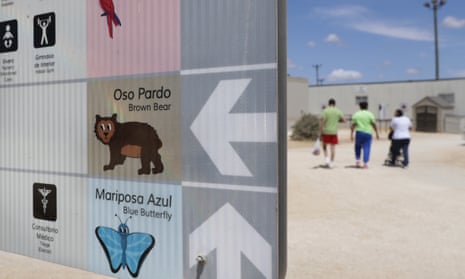US officials gave dozens of detained immigrant parents an ultimatum – allow your children to be released from detention without you or face indefinite detention together, according to legal representatives from the country’s three family detention centers.
In one chaotic day on Thursday, US Immigration and Customs Enforcement (Ice) instituted what legal representatives for detained families called an “indefinite detention or family separation” policy. Ice officials met with asylum-seeking parents, gave them papers and told them conflicting things about what signing the documents meant, advocates said.
At the country’s largest family detention center in Dilley, Texas, a lawyer said Ice stopped mothers from keeping copies of the document and ignored their requests to speak to attorneys before signing.
“One mother reported that Ice officers were very mad when she refused to sign, they were intimidating, they were speaking firmly to her and when she said she didn’t want to sign, they told her it wasn’t really up to her,” said Allison Herre, managing attorney for the Dilley Pro Bono Project.
The attorney Bridget Cambria represents families at Berks detention center in Pennsylvania and said the pro-bono law firm Aldea’s phone line was flooded with calls from families on Thursday.
“The families were each upset, most of them were crying,” Cambria said. “Because immigration had called them down one by one and told them that if they wanted their children to leave detention, they had to sign a paper that would separate the parents from the child.”
Because prisons are a cauldron for infectious disease, the US immigration detention system is facing additional scrutiny amid the Covid-19 outbreak.
People inside these facilities are detained on civil immigration violations, not criminal charges, and the government has the power to release them unless they are considered a danger to the community.
In February, advocates urged the government to release people held in the world’s largest immigrant detention system to minimize the spread of coronavirus before it was too late.
Last week, Carlos Ernesto Escobar Mejía became the first person to die from Covid-19 in immigration custody.
The push to have parents release their children but remain detained themselves came the day before the government was due to provide a report to a court on how many children are in detention as part of the Flores settlement. That agreement says the government must hold children in the least restrictive setting and release them as quickly as possible, generally after 20 days in detention.
Donald Trump’s administration has repeatedly attempted to end these court-ordered protections and has kept children well past the 20-day limit.
On Thursday, there were 163 children at the detention centers in Dilley, Berks and Karnes City, Texas, detained an average of 137 days, attorneys said. Lawyers wrote to the independent monitor for the Flores settlement to report on what they described as a coercive and unconstitutional attempt to put in place a “indefinite detention or family separation” policy.
“My assumption is that they will be using what they have done today to convince federal judges that they have complied with the Flores settlement and other orders of federal courts,” Cambria said. “I am telling you right now they have not.”
The chairman of the House homeland security committee, Bennie Thompson, urged the Trump administration to end the practice immediately.
“While the number of Covid-19 cases in Ice facilities continues to rise daily, the administration should use its authority to release families – together – as much as possible,” Thompson, a Mississippi Democrat, said in a statement. “Parents should not be placed in the impossible position of choosing between the safety of their children or being separated.”
Ice did not immediately respond to a request for comment. On Sunday, an Ice spokesperson said in a statement: “Ice has not instituted binary choice or separated any parents from their child pursuant to ‘binary choice’, and Ice has not implemented any new forms to conduct the new parole determinations as required by the court- any assertion to the contrary is plainly false.”
